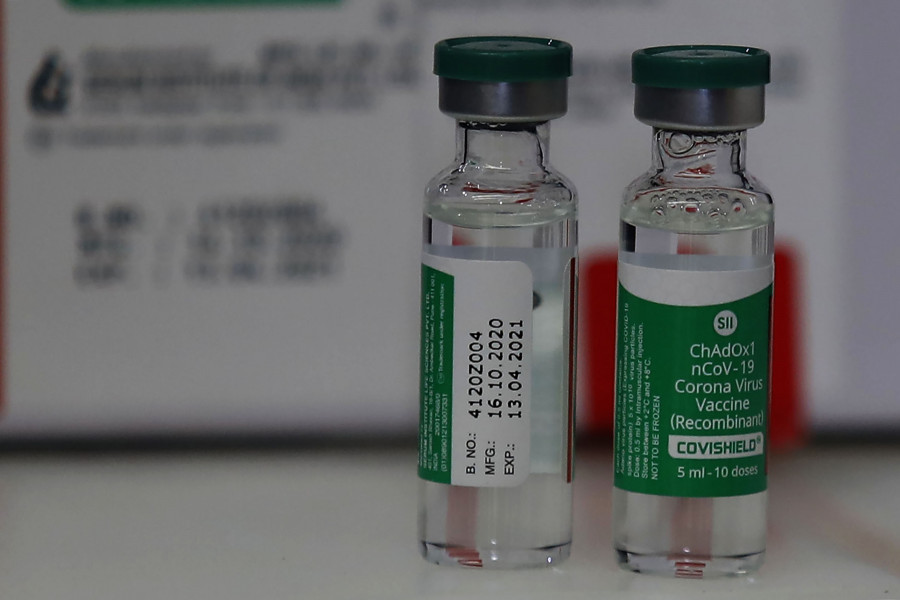National
As Nepal struggles to continue vaccine drive, India denies export restrictions
With supply halted, government has stopped the inoculation campaign.
Suresh Raj Neupane
Amid reports that India has put a hold on exports of AstraZeneca vaccine, manufactured by the Serum Institute of India, the Ministry of External Affairs of India has said that they have not imposed restrictions as such and that New Delhi is just trying to prioritise the demand at home.
“India has not enforced any restrictions on exports of Covid-19 vaccines,”
Arindam Bagchi, spokesperson for the Ministry of External Affairs of India, said during the weekly press briefing on Friday. “We will export vaccines taking into account the domestic demand.”
India’s decision to ban exports of vaccines has created confusion whether Nepal would be able to continue its vaccination drive, which was launched on January 27 after it provided 1 million doses in grant.
The Serum Institute has yet to provide 1 million doses, of the 2 million doses for which Nepal has already paid for, given the Indian ban on exports of vaccines.
The Serum Institute had last committed to providing one million doses of vaccine by April 2, according to officials.
Officials at the Ministry of Health say the company has not sent any information about delivering the vaccines as of Friday evening.
“There is no news yet whether they will be sending the remaining doses,” an official at the Health Ministry told the Post. “Had there been any plans to supply the remaining doses of vaccine, they would have written to us two or three days in advance.”
Nepal’s vaccination drive is currently in limbo, despite the country becoming one of the first in the world to launch the campaign.
In the first phase, the government vaccinated 438,000 people from January 27 to March 5.
The government says it currently has around 500,000 doses in stock, just enough to give the second shot to those who took the first jab in the first phase. During the second phase from March 7 to 15, Nepal inoculated a little over 1.35 million people, those over 65 years of age.
With vaccine supply coming to a halt, officials at the Health Ministry say they have no idea what they are going to do.
“The Serum Institute has assured us of supplying the remaining one million doses by the end of April,” said Dr Roshan Pokhrel, chief specialist at the Health Ministry.
The halt to exports of the AstraZeneca vaccines by India is also going to affect the World Health Organization-backed COVAX facility, under which Nepal is expected to receive around 13 million doses so as to vaccinate around 20 percent of the 30 million population.
Nepal so far has received 348,000 doses under the COVAX facility.
The UN health agency meanwhile has said that the countries should make their “own decisions” to vaccinate people given the shortages of the vaccines in the wake of India’s decision to halt exports.
As India is reporting a surge in Covid-19 cases, concerns have also grown in Nepal, which after seeing a dramatic decline in infection numbers is witnessing a steady rise in cases. Public health experts have also warned of a possible second wave. Amid this, they say, it would be wrong to be complacent and that unless a majority of people are vaccinated, the risk remains.
As of now, Nepal has vaccinated a little over 5 percent of the total population.
With vaccine supply coming to a halt, concerns are growing over Covid-19 penetrating society again, as experts say there is no way to call the risk over until a majority of people are vaccinated.
Officials at the Nepali embassy in Delhi say they have been discussing the supply of vaccines not only with the Serum Institute but also with Niti Aayog, a policy think tank of India, and India’s Ministry of External Affairs and Ministry of Health.
According to Nepali officials, the Serum Institute has said that as a manufacturer, its job is to produce and supply the vaccines, but given the need at home, it also has to take into consideration what the government of India says in the wake of rising number of cases and the demand at home.
Apart from the 500,000 doses of AstraZeneca vaccine, the one manufactured by the Serum Institute which Nepal has been using, 800,000 doses of Sinopharm vaccine too are currently with the government. The Health Ministry has suggested using the Chinese vaccine on people between 40 and 54 years of age. There is no clarity as to when the use of the Chinese vaccine could start.
Officials at the Health Ministry say things would be back on track if the Serum first provided the remaining 1 million doses and then started taking the process to supply additional 5 million doses that Nepal wants to buy.
“No agreement has been reached yet with regard to buying the additional 5 million doses,” said Pokhrel.
Arjun Poudel contributed reporting.




 16.47°C Kathmandu
16.47°C Kathmandu














